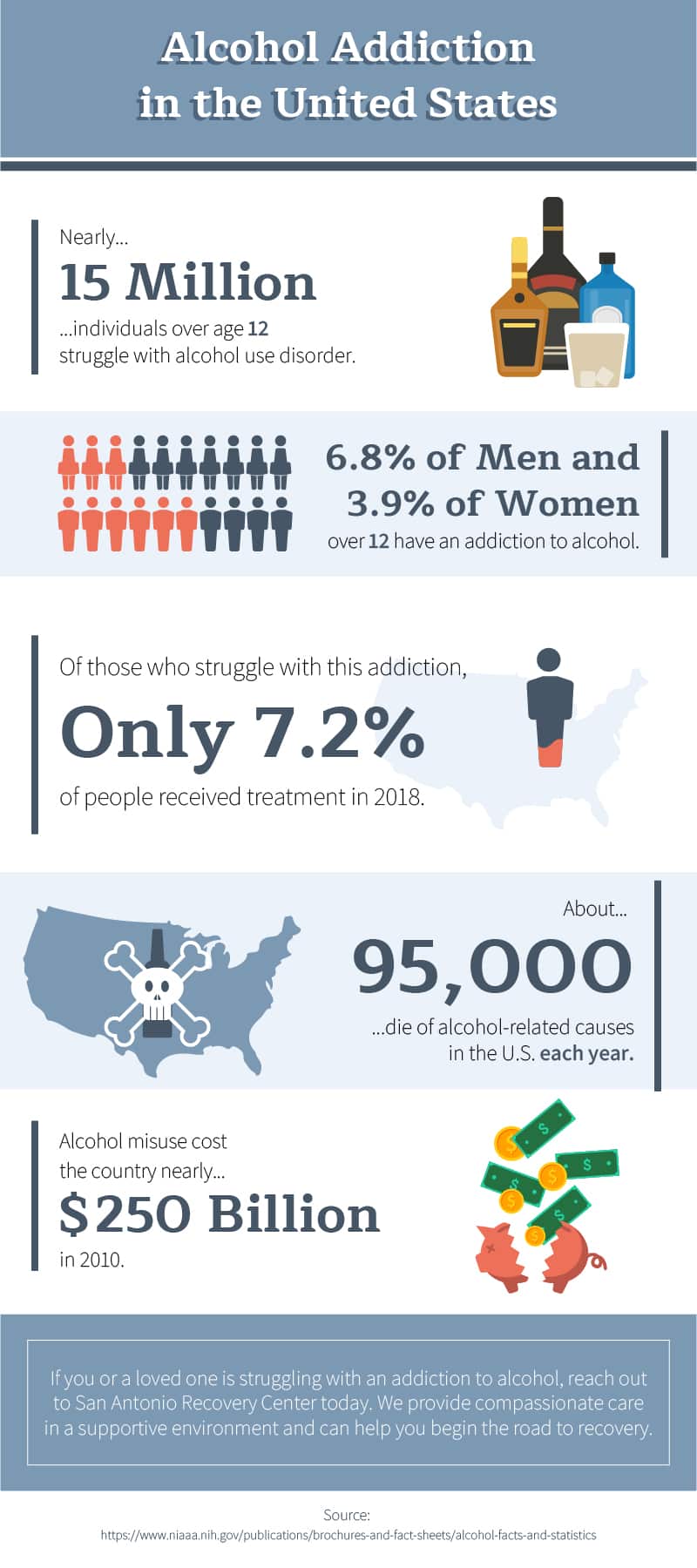Millions of individuals in the United States alone struggle with alcohol addiction. Alcohol is widely available and culturally acceptable, and some people even see drinking to excess as a rite of passage for young adults. In the movies, TV, and print media, alcohol is prevalent. However, alcohol can also be addictive. Alcohol addiction has ruined many lives and caused damage to relationships, mental and physical health, and finances. In some cases, alcohol addiction can be fatal. Thousands die each year as a result of drunk driving accidents. This is why San Antonio Recovery Center is committed to making alcohol rehab programs accessible and affordable for residents of Texas and beyond.

It can be difficult to know how to help an alcoholic or how to get an alcoholic into rehab. However, once they admit they need a professional alcohol rehab center, their journey to recovery can begin. Every rehab program begins with an intake evaluation. This gives the people in charge of your care the opportunity to learn more about your history. Intake is crucial because it ensures patients receive custom, specific treatment.
No two patients are alike, and therefore, no two people should go through the same plan for addiction treatment. Counselors use the information they gather during intake to create the best treatment plan for your unique needs.
Furthermore, finding out more information about your physical health is often a priority during an intake evaluation. Mental and family health histories are also important. In addition, medical professionals ask patients about their addiction history, their rate of alcohol consumption, and how long they’ve been abusing the substance.
After intake, detox is the next step on the road to recovery. If you've tried to stop drinking in the past, you likely know that withdrawal symptoms can accompany new sobriety. Common alcohol withdrawal symptoms include:
The withdrawal symptoms that you experience will vary depending on the severity of your addiction. If you try to detox on your own, you might end up relapsing in order to feel relief from these withdrawal symptoms. However, at San Antonio Recovery Center, our addiction treatment specialists will provide the medical and emotional support you need to make it through this challenging part of the recovery process.

Therapy is the foundation of addiction treatment. Thus, if you plan to attend alcohol rehab, you should prepare for multiple addiction therapy sessions. At San Antonio Recovery Center, we provide a broad range of therapeutic options to help you or a loved one struggling with alcohol addiction. These approaches include evidence-based, clinical modalities administered by certified professionals and medical staff and holistic treatments to improve the mind, body, and spirit. Every client is different, so a combination of various therapeutic approaches offers the best chance of a successful recovery. We offer proven, effective therapies administered by caring, professional personnel with a treatment plan designed specifically for each client.
Here are a few examples of our clinical therapeutic offerings:
Counselors conduct behavioral therapy in a one-on-one environment. CBT focuses on regulating emotions and changing problematic thoughts and responses related to drinking and situations that involve drinking. EMDR helps patients confront distressing or traumatic thoughts and images and then redirect their feelings and emotions until they can control their responses to the stimulus. MAT involves the administration of FDA-approved medications, most often during detox, to help with uncomfortable withdrawal symptoms.
Family therapy focuses on repairing damaged relationships within the family dynamic. Having a supportive family greatly enhances chances of successful recovery; however, there may be lingering resentment or anger that must be addressed. By understanding the needs of the client and setting healthy boundaries, families can heal together. Group therapy shows patients they are not alone in their struggles. Having a supportive group of individuals who have gone through the same thing promotes accountability and develops communication skills.
An evidence-based approach to alcohol addiction recovery includes therapy, medical support, and proven treatments. However, there are many alternative and holistic therapies that make a difference as well.
At San Antonio Recovery Center, our methods include:
How do these holistic therapies help our patients heal? Alcohol addiction can make it difficult to take care of yourself. However, physical activity can provide a healthy outlet for stress and can help you rebuild your strength. Healing in mind, body, and spirit is also essential for long-term recovery, and these holistic therapies can help you connect with your emotions in a healthy way.
contact us now!
